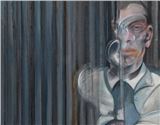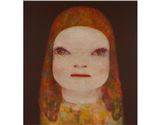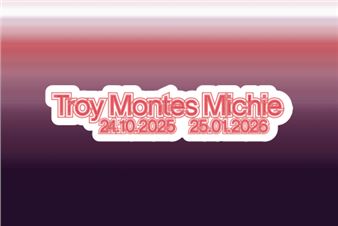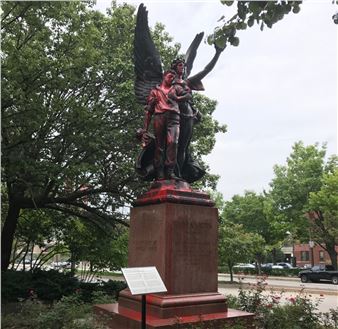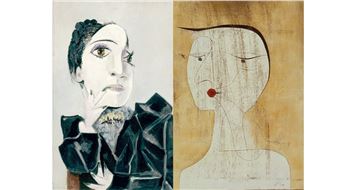A Requiem For Humanity: Dehumanisations, Power And Black Futurisms
In the black intellectual tradition, the fundamental issue is not class or race, but contesting the Western symbolic order and the Christian vision of 'the human': a symbolic order in which black subjects are objectified, inferiorised and animalised, and thus expelled from the вҖңhumanityвҖқ that the Western bourgeois embodies. This is the starting point for A requiem for humanity, dehumanisations, power and black futurisms, an exhibition curated by Tania Adam, which approaches the scientific, cultural and religious production that led to the de-humanisation of вҖңthe negroвҖқ and the resulting violence on black people. It will also examine and deal with the utopias that allow us to imagine a future of emancipation.
The exhibition is organised along these lines of reasoning. There is an initial section, entitled вҖңDehumanisationвҖқ, with works by Claudia Claremi, Frida Orupabo, Sybil Coovi Handemagnon, D. W. Griffith and Archivos Negros, which shows how this construct of the anti-black world leads to a timeless and incessant spiral of violence that persists in present-day societies. Part two вҖ“ вҖңRehumanizationвҖқ, with pieces by the Kongo Astronauts, The Otholith Group, Alice Coltrane, Sun Ra, Drexciya, W.E.B. Du Bois, Ishmael Reed, Octavia E. Butler, Fred Moten, Sony Labuo Tansi, Kodwo Eshun, Louis Chude-Sokei, Amos Tutuola, Nihiloxica, Drecxiya and Lee 'Scratch' PerryвҖ“ proposes a utopian approach to reflecting and imagining a humanity that goes beyond the human, flirting with a mythology that breaks down the distinctions between the human, the alien and the machine. It is a form of Rehumanisation, of repairing and rehistoricising in order to take back the power of the narrative. We may also say it allows us to celebrate a Requiem for misrepresented humanity.
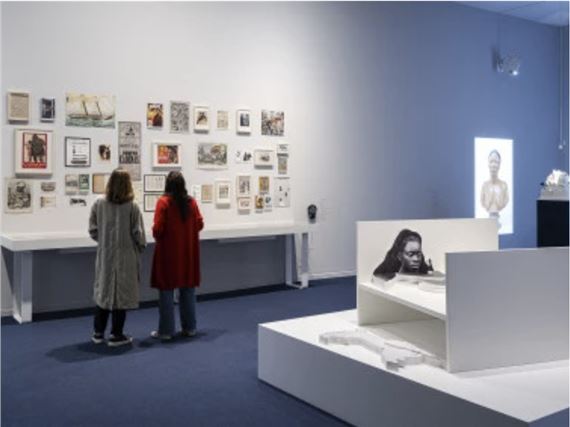
Recommended for you
In the black intellectual tradition, the fundamental issue is not class or race, but contesting the Western symbolic order and the Christian vision of 'the human': a symbolic order in which black subjects are objectified, inferiorised and animalised, and thus expelled from the вҖңhumanityвҖқ that the Western bourgeois embodies. This is the starting point for A requiem for humanity, dehumanisations, power and black futurisms, an exhibition curated by Tania Adam, which approaches the scientific, cultural and religious production that led to the de-humanisation of вҖңthe negroвҖқ and the resulting violence on black people. It will also examine and deal with the utopias that allow us to imagine a future of emancipation.
The exhibition is organised along these lines of reasoning. There is an initial section, entitled вҖңDehumanisationвҖқ, with works by Claudia Claremi, Frida Orupabo, Sybil Coovi Handemagnon, D. W. Griffith and Archivos Negros, which shows how this construct of the anti-black world leads to a timeless and incessant spiral of violence that persists in present-day societies. Part two вҖ“ вҖңRehumanizationвҖқ, with pieces by the Kongo Astronauts, The Otholith Group, Alice Coltrane, Sun Ra, Drexciya, W.E.B. Du Bois, Ishmael Reed, Octavia E. Butler, Fred Moten, Sony Labuo Tansi, Kodwo Eshun, Louis Chude-Sokei, Amos Tutuola, Nihiloxica, Drecxiya and Lee 'Scratch' PerryвҖ“ proposes a utopian approach to reflecting and imagining a humanity that goes beyond the human, flirting with a mythology that breaks down the distinctions between the human, the alien and the machine. It is a form of Rehumanisation, of repairing and rehistoricising in order to take back the power of the narrative. We may also say it allows us to celebrate a Requiem for misrepresented humanity.
Artists on show
- Alice Coltrane
- Amos Tutuola
- Archivos Negros
- Claudia Claremi
- David Wark Griffith
- Drexciya
- Fred Moten
- Frederick Douglass
- Frida Orupabo
- Ishmael Reed
- Kodwo Eshun
- Kongo Astronauts
- Lee Scratch Perry
- Louis Chude-Sokei
- Nihiloxica
- Octavia E. Butler
- Olaudah Equiano
- Paul Gilroy
- Saidiya Hartman
- Sojourner Truth
- Sony Lab'uo Tansi
- Sun Ra
- Sybil Coovi Handemagnon
- The Otolith Group
- William Edward Burghardt Du Bois
- Zora Neale Hurston

 ARTISTS
ARTISTS
